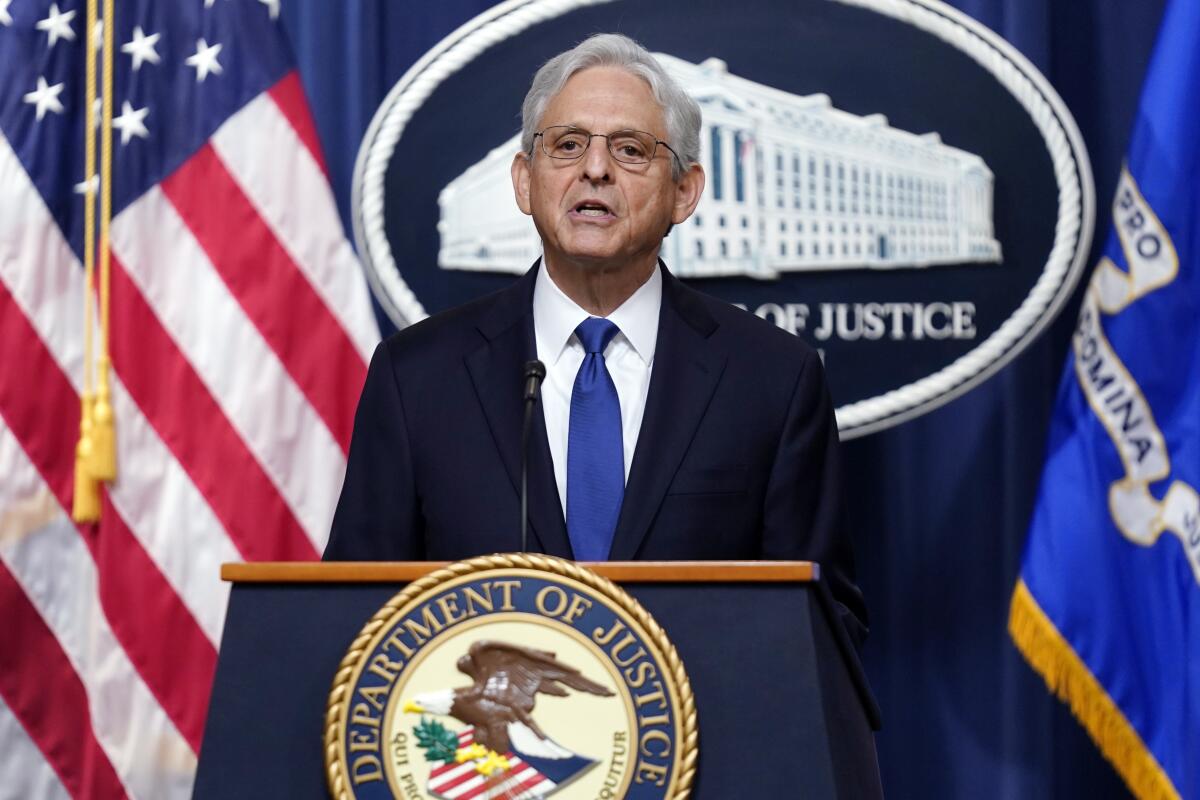Speaker Johnson says House will go to court for Biden audio as Justice Department declines to prosecute

- Share via
WASHINGTON — Republican Speaker Mike Johnson says the House will go to court to enforce the subpoena against Atty. Gen. Merrick Garland for access to President Biden’s special counsel audio interview, after the Justice Department refused to prosecute Republicans’ contempt of Congress charge.
Johnson on Friday called it “sadly predictable” that the Justice Department would not prosecute Garland.
In a letter to Johnson (R-La.) earlier Friday, a Justice Department official cited the agency’s “longstanding position and uniform practice” not to prosecute officials who don’t comply with subpoenas when a president makes a claim of executive privilege.
The Democratic president asserted executive privilege in the matter last month, blocking the release of the audio, which the White House says Republicans want only for political purposes. House Republicans moved forward with the contempt effort anyway, voting Wednesday to punish Garland for refusing to provide the recording.
Assistant Atty. Gen. Carlos Felipe Uriarte noted that the Justice Department, under Republican and Democratic presidents, has declined to prosecute in similar circumstances when there has been a claim of executive privilege.
Accordingly, the department “will not bring the congressional contempt citation before a grand jury or take any other action to prosecute the Attorney General,” Uriarte said in the letter to Johnson. The letter did not specify who in the Justice Department made the decision.
Republicans were incensed when special counsel Robert Hur declined to prosecute Biden over his handling of classified documents, and quickly opened an investigation. GOP lawmakers — led by Reps. Jim Jordan of Ohio and James Comer of Kentucky — sent a subpoena for Hur’s interviews with Biden earlier this spring. The Justice Department turned over some of the records, leaving out audio of the interview with the president.
Republicans have accused the White House of suppressing the tape because they say the president doesn’t want voters to hear it.
The attorney general has said the Justice Department has gone to extraordinary lengths to give lawmakers information on Hur’s investigation. Releasing the audio, however, could jeopardize future sensitive and high-profile investigations because witnesses may be less likely to cooperate if they know their interviews might become public, Garland has said.
In a letter last month detailing Biden’s decision to assert executive privilege, White House counsel Ed Siskel accused Republicans of seeking the recordings so they can “chop them up” and distort them to attack the president. Executive privilege gives presidents the right to keep information from the courts, Congress and the public to protect the confidentiality of decision making, though it can be challenged in court.
The Justice Department noted that it also declined to prosecute Atty. Gen. William Barr, who was held in contempt in 2019. The House, under Democratic control at the time, voted to issue a referral against Barr after he refused to turn over documents related to a special counsel investigation into then-President Trump.
The Justice Department similarly declined to prosecute former Trump White House Chief of Staff Mark Meadows after he was held in contempt of Congress for ceasing to cooperate with the House committee investigating the Jan. 6, 2021, attack on the U.S. Capitol.
The department also took no action against Atty. Gen. Eric H. Holder Jr., who in 2012 was held in contempt related to the gun-running operation known as Operation Fast and Furious.
Two former Trump White House officials, Peter Navarro and Stephen K. Bannon, were prosecuted for contempt of Congress for defying subpoenas from the Jan. 6 committee. They were both found guilty at trial and sentenced to four months in prison. Navarro has been behind bars since March, and Bannon has been ordered to report to prison by July 1.
The special counsel in Biden’s case, Hur, spent a year investigating the president’s improper retention of classified documents from his time as a senator and as vice president. Hur said he found insufficient evidence to successfully prosecute a case in court.
A transcript of the Hur interview showed Biden, 81, struggling to recall some dates and occasionally confusing some details — something longtime aides say he’s done for years in public and private — but showing deep recall in other areas.
Richer and Amiri write for the Associated Press.
More to Read
Sign up for Essential California
The most important California stories and recommendations in your inbox every morning.
You may occasionally receive promotional content from the Los Angeles Times.










